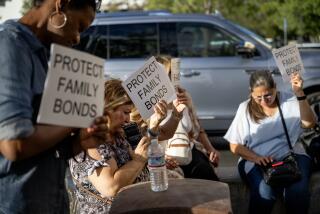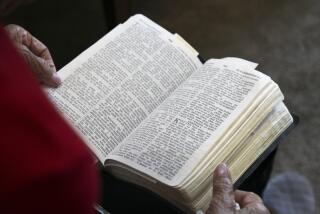Bill Moyers Helps Take a Scholarly Look at ‘Genesis’
- Share via
Bill Moyers’ series on PBS about the Bible’s opening book might be remembered best years from now as the time many Jews and Christians first heard that Muslims also trace their religious self-definitions from those ancient stories, especially about Abraham’s family.
Not that the television veteran doesn’t deftly moderate “Genesis: A Living Conversation,” which premieres tonight, while his well-chosen panelists examine the familiar-yet-strange saga from Adam and Eve’s exile from paradise to Joseph’s exile to servitude in Egypt.
And pleasing camera work and refreshingly civil discussions often overcome the problem of seven panelists talking for nearly an hour--not just biblical scholars and theologians, but artists, novelists, lawyers and other professionals.
But the 10-part series most notably marks a real departure for television treatment of the Bible. On the fifth, sixth and seventh programs, each panel has one Muslim voice discussing the Koran’s perspective on Abraham, his wife Sarah, his mistress Hagar, and sons Ishmael and Isaac. The common tradition is that the son of Hagar by Abraham is the first Arab and the son of Sarah by Abraham begins the line of Jews.
Azizah Y. Al-Hibri and Seyyed Hossein Nasr--two scholars of Islam--would not be the first Muslims to take part in a tri-faith discussion of the shared roots of each religion. A trio of Southern California clergy takes just such a trialogue on the road, but the national television exposure, complete with resource guides provided to many discussion groups, should achieve a new level of interfaith awareness.
To be sure, Al-Hibri and Nasr reflect the theologically more conservative Islamic trust and confidence in God’s righteousness. By contrast, the Catholic, Protestant and Jewish panelists more freely express the difficulty for faith posed at times by God’s apparently cruel and arbitrary acts.
When Abraham, for instance, is told by God to slay his son Isaac as a test of faith, Nasr disagrees with other panelists that it is a horrifying order, saying it is merely the supreme test for the already much-tested patriarch.
Panelist Burton L. Visotzky, acknowledging Islam’s theme of submission to God since the religion’s seventh century start, says, “It took Islam for the Jewish community to be open to this idea of submission.” Visotzky’s Genesis Seminar at the Jewish Theological Seminary in New York City provided a model for the series and he appears on most of the shows.
“Genesis” begins not with the beginning, Creation, but with “The First Murder,” the story of Cain and Abel. Typical television, using violence as the lure?
Actually, that program is hardly livelier than the second episode, also airing tonight, which deals with the dawn of life and whether Eve is depicted as subservient to Adam. This episode thankfully does not visit the evolution-creationism debate.
The series examines Genesis for its ethics and meaning as well as the evolution of its characters, primarily God. For the latter point, it’s too bad that Pulitzer Prize winner Jack Miles (“God, a Biography”) of Claremont Graduate School was not among the panelists.
Another omission, I believe, was not bringing in scholarship that says whoever edited the Book of Genesis centuries ago blended more than one account into the final version. Thus, on the second program, when panelists refer to “the first” and “second” story of Adam and Eve’s creation, most viewers might wonder what they mean. This is because the biblical story is usually read and heard as a seamless garment. Some difficulties of interpreting Genesis, scholars say, can be attributed to the cross-purposes of different writers’ stories.
* “Genesis: A Living Conversation” will be shown from 8 to 10 tonight, then will be seen Thursdays at 10 p.m. on KCET-TV Channel 28.
* MORE ON GENESIS
An ark-load of authors is examining the Bible’s Book of Genesis. E1
More to Read
The complete guide to home viewing
Get Screen Gab for everything about the TV shows and streaming movies everyone’s talking about.
You may occasionally receive promotional content from the Los Angeles Times.





